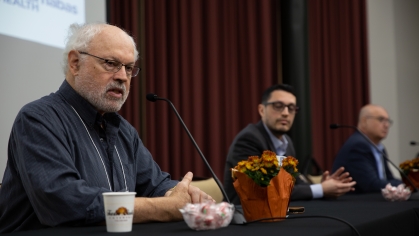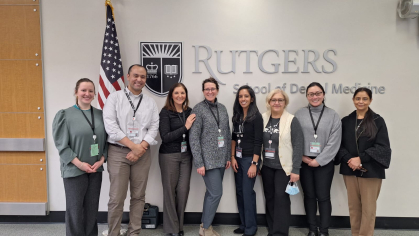Rutgers School of Public Health Dean Receives J. Michael McGinnis Leadership Excellence Award

Perry N. Halkitis, dean of the Rutgers School of Public Health, received the J. Michael McGinnis Leadership Excellence Award from the Interdisciplinary Association for Population Health Science.
The accolade honors a leader whose outstanding accomplishments, commitment, values and contributions advance population health through science, translational activities and academic service.
“Dean Halkitis is a bold and compassionate leader whose scholarship, advocacy, and institution-building have shaped not only the Rutgers School of Public Health, but the field at large,” said Rutgers Health Chancellor Brian Strom. “Through his tireless work to confront health disparities and champion equity, he has created a model for what public health leadership should look like in the 21st century. We are lucky to have him here at Rutgers Health.”
Halkitis is an infectious disease epidemiologist, applied statistician and public health psychologist. He conducts this work through his research, teaching and activism, addressing health inequities among sexual, gender and racial-ethnic minority populations, which spans the prevention and treatment of infectious diseases, including HIV, as well as mental health and substance use disorders.
Dean Halkitis is a bold and compassionate leader whose scholarship, advocacy, and institution-building have shaped not only the Rutgers School of Public Health, but the field at large.
Brian L. Strom
Chancellor, Rutgers Health
“This recognition underscores both Dean Halkitis’ profound influence in the profession and the broader commitment of our university to advancing equity and social justice in health,” said Jaya Satagopan, professor and associate dean for faculty affairs at the Rutgers School of Public Health.
“I am deeply honored that the Interdisciplinary Association for Population Health Science has selected me for the McGinnis Leadership Award,” said Halkitis, who also is the Hunterdon Professor of Public Health & Health Equity and Distinguished Professor of Biostatistics & Epidemiology at the Rutgers School of Public Health. “Over the past 30 years, the work I have undertaken with my colleagues has been driven by a steadfast commitment to advancing the health and well-being of people and communities.
“I accept this award with humility and pride, on behalf of the Rutgers School of Public Health and all those who have joined me in this mission,” he added. “My one request in receiving the award in this very tenuous moment is for all leaders in public health and administrators in higher education to continue to be brave, upholding our ethics and our commitments to science, teaching and community engagement.”
Since 2017, Halkitis has helped position the Rutgers School of Public Health as a leader in interdisciplinary research, inclusive education and community engagement. He has led institutional efforts to expand access to public health training, diversify the field’s academic pipeline and align the school’s strategic priorities with a broader vision of equity and social justice.
This includes founding and directing the school’s Center for Health, Identity, Behavior & Prevention Studies, a nationally recognized center for the study of the well-being of all people, including sexual, racial, ethnic and cultural minorities and other marginalized populations.
In addition to his leadership at Rutgers, Halkitis is widely recognized for his contributions to population health, including mentoring early-career scholars and shaping public health discourse at the intersection of research, policy and advocacy. Halkitis has been a vocal critic of health disparities and the politicization of public health, which he further dissects in his upcoming publication, Humanizing Public Health: How Disease-centered Approaches Have Failed Us.
“At the heart of public health lies humanity – an idea I explore in depth in my forthcoming book – and I am profoundly grateful to have been able to center this humanity in my efforts to address infectious diseases, mental health burdens, and substance use over the decades,” Halkitis said.
The award, named in honor of J. Michael McGinnis, a national leader in population health whose work reshaped federal public health priorities and programs, recognizes individuals whose careers reflect a sustained commitment to improving health outcomes through evidence-based, interdisciplinary approaches.
“I am especially appreciative that the Interdisciplinary Association for Population Health Science has recognized that public and population health are not disciplines that stand alone,” Halkitis said. “Rather, they flourish at the intersection of many fields, disciplines, and perspectives. Work that is confined to a single lens is inherently limited. To truly advance the health of everyone, we must bring all disciplines together under the shared umbrella of public and population health.
“And above all, we must remain committed to keeping public and population health centered on people – their lived experiences, environments, and social conditions – not solely on pathogens or disease in an overly medicalized way. It is only by prioritizing the humanity behind the science that we can create lasting and meaningful change.”



